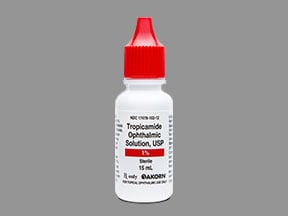
Mydriacyl Coupons & Savings Card – Discount Prices from $17.39
Brand for: Tropicamide
My prescription
Edit
15ML of 1%, Tropicamide (1 Bottle)
Select pharmacy

CVS
$32.73
COUPON PRICE
Albertsons
$17.39
COUPON PRICE
Walgreens
$17.72
COUPON PRICE
Walmart
$20.74
COUPON PRICEMydriacyl savings card
Show this card to your pharmacist
Albertsons
$17.39
BIN
ID
PCN
GRP
011867
LH8257E9D6
HT
LABH001
Powered by
Related anticholinergics prescriptions
More prescriptions for pupil dilation
Related anticholinergics prescriptions
More prescriptions for pupil dilation
Mydriacyl (Tropicamide) dosage forms
Dosage Quantity Price from Per unit 15ML 1 Bottle $22.32 $22.32 15ML 2 Bottles $29.64 $14.82 15ML 3 Bottles $36.96 $12.32
| Dosage | Quantity | Price from | Per unit |
|---|---|---|---|
| 15ML | 1 Bottle | $22.32 | $22.32 |
| 15ML | 2 Bottles | $29.64 | $14.82 |
| 15ML | 3 Bottles | $36.96 | $12.32 |
What are mydriacyl eye drops used for?
Mydriacyl eye drops are used to dilate the pupils. They are often administered before eye examinations to allow the eye care professional to get a better view of the interior structures of the eye. Additionally, they may be used in certain medical conditions where pupil dilation is necessary.
Is mydriacyl the same as tropicamide?
Yes, Mydriacyl is a brand name for the drug tropicamide.
What is Alcon Mydriacyl used for?
Alcon Mydriacyl is used to dilate the pupils during eye examinations or procedures. It helps eye care professionals to better examine the interior of the eye.
What are the side effects of mydriatic drops?
Mydriatic drops, which are used to dilate the pupils, can have several side effects. Common side effects include stinging or burning sensation in the eyes, increased sensitivity to light, and blurred vision. Less commonly, they may cause headache, dry mouth, or increased heart rate. In rare cases, they can lead to allergic reactions or increased intraocular pressure. It is important for individuals to follow their healthcare provider's instructions and report any unusual symptoms.
What is the active ingredient in Mydriacyl eye drops?
The active ingredient in Mydriacyl eye drops is tropicamide.
